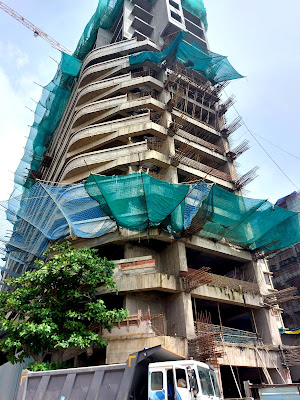Demonetization, RERA, GST and being inside the Real Estate bubble.
From the desk of Vitasta Raina
I have come to the conclusion that jargon is a very valuable thing when you're trying to fit in.
Recently I shifted base from National Capital New Delhi, back to my adopted hometown of Mumbai. I had been away for almost 5 years, within which time, a lot has changed in the world of Real Estate, at the national front as well as in the city of Mumbai. While the RERA [Real Estate (Regulation and Development) Act, 2016] has shaken up the larger activities in the sector at a national front, the new Mumbai Development Plan (DP) for 2034 , have altered things up even further in the city and extended suburbs of Mumbai.
In the last five years, I have been largely away from the RE sector, and I am yet to come to grips with the new jargon; demonetization, GST, Benami Properties, RERA, REIT et al. This blog post is to build my own understanding about these various terms rather than an analysis of their possible impacts. For my own benefit, I'm going to do this in alphabetical order. The scope of the impacts of these developments are focused only on Real Estate, with an emphasis on Mumbai, the city of dreams.
1. Benami Transactions (Prohibition) Amendment Act, 2016
This is fairly simple to understand. Benami means 'without a name, or in the wrong name, or false name (pseudonym)'. Apparently, in a lot of property transactions, land is purchased in the name of a confidant, or a close relation, rather than in the name of the person funding the purchase. That is, I want to buy a plot of land for which I have the money ready, but instead of going in for a transaction under my name, I give the money to purchase the plot in my brother's name. I think this avoids a lot of taxation, and people save money. I'm not sure why anyone would go in for such an arrangement, but then I'm not rich enough to understand the workings of the upper moneyed class. This also has an impact after the demonetization drive after a bunch of rich folks with a lot of 'black (tax free)' money deposited the money in the accounts of people with no money and were able to get the money back via the bank in installments.
There was a story about some politicians who had purchased land and were getting into the real estate business but they didn't want this to be reflected in their assets, so they bought land in someone else's name and made a whole RE (Real Estate) company to carry out development work, while they went around in white kurta-pajamas for election campaigns garnering votes and sympathies for being
'one with the masses' and appear as a working class social workers. We all agree, they are scum.
I think this move makes the RE sector more transparent and a little bit cleaner. I mean I don't want to buy a house in a project where the money for the land as well as the money for the sales goes to some corrupt politician, or gangster.
2. Demonetization
The Central govt. outlawed Rs 1000 and Rs 500 notes in November of 2016. It lead to severe upheaval with long lines for drawing cash out of banks and defunct ATMs across the country. The idea was to make the country a 'cashless economy' and bring all transactions into the formal economic system. In so far as the real estate sector goes, I read somewhere that between 7 to 30% of all real estate transactions were cash based, with a large portion of this in the black money sector (tax-free, tainted money). This caused a slump in the sector. This act, along with the Benami Property act followed swiftly by the Good and Services Tax and the updated RERA guidelines caused a lot of anxiety among developers and builders, which led to a bit of speculation and a lot of 'HODL'. Everybody decided to wait and join the RE #HODLGANG. That's all I know about the effect of demonetization in RE. No one knew what was happening for certain, and everyone waited for an expert take, which came in the form of newspaper reports, and KPMGs and JLLs and the like. The Central govt. meanwhile leaned back and waited for the same KPMGs and JLLs to explain to them what they had already done. They will soon propagate the same. I doubt anyone really knows anything, and wonder if almost everyone involved is just winging it.
3. GST (Goods and Services Tax)
There is a lot of good analysis available online for understanding the impact of GST on RE. You can read them here(1), here(2) and here(3). The last link (here3) also gives an assessment of the impact of demonetization.
The Central govt. outlawed Rs 1000 and Rs 500 notes in November of 2016. It lead to severe upheaval with long lines for drawing cash out of banks and defunct ATMs across the country. The idea was to make the country a 'cashless economy' and bring all transactions into the formal economic system. In so far as the real estate sector goes, I read somewhere that between 7 to 30% of all real estate transactions were cash based, with a large portion of this in the black money sector (tax-free, tainted money). This caused a slump in the sector. This act, along with the Benami Property act followed swiftly by the Good and Services Tax and the updated RERA guidelines caused a lot of anxiety among developers and builders, which led to a bit of speculation and a lot of 'HODL'. Everybody decided to wait and join the RE #HODLGANG. That's all I know about the effect of demonetization in RE. No one knew what was happening for certain, and everyone waited for an expert take, which came in the form of newspaper reports, and KPMGs and JLLs and the like. The Central govt. meanwhile leaned back and waited for the same KPMGs and JLLs to explain to them what they had already done. They will soon propagate the same. I doubt anyone really knows anything, and wonder if almost everyone involved is just winging it.
3. GST (Goods and Services Tax)
There is a lot of good analysis available online for understanding the impact of GST on RE. You can read them here(1), here(2) and here(3). The last link (here3) also gives an assessment of the impact of demonetization.
Basically, there were multiple charges and taxes that a developer had to cough up such as VAT, service tax, stamp duty, registration charges etc, and the GST has group these together within itself. i.e. insteading of paying: VAT, and Service Tax amounting to ~11.5% taxation, a building would now pay 12% GST, which the developer will pass on to the buyers, making property dearer by 1 or 2%. They'll still charge Stamp Duty and Registration Charges, though. The tax has also rationalised the pricing of raw materials such as cement and steal, making some materials cheaper and others costlier. I don't know how this move is 'good' or 'bad' for the sector. Overall, I doubt that it'll have any serious impact. Anyway, like I said, there is a lot of good analysis out there for this subject. Which brings us down to the RERA. But before that, a quick look at what is happening in the affordable housing segment thanks to the GST.
So, Affordable Housing got Infrastructure Status recently, and that means a couple of tax breaks, and levy of only 8% GST as opposed to the 12% which is otherwise applicable. I don't want to dwell too much on the PMAY aspect of this (Pradhan Mantri Awas Yojana -Housing For All) because I want to cover that in the next few blog posts, particularly the hurdles that the ambiguity about the mission has brought about in the private sector and why there is a need for various KPMGs to exist, because the central and state governments don't believe in straight talk. Jargon has made us all wary of the policies and products offered by the many schemes and programmes. Why do we need an interpreter, an all-knowing journalist who needs to impart common wisdom. Anyway, the last aspect we cover in this is RERA.
So, Affordable Housing got Infrastructure Status recently, and that means a couple of tax breaks, and levy of only 8% GST as opposed to the 12% which is otherwise applicable. I don't want to dwell too much on the PMAY aspect of this (Pradhan Mantri Awas Yojana -Housing For All) because I want to cover that in the next few blog posts, particularly the hurdles that the ambiguity about the mission has brought about in the private sector and why there is a need for various KPMGs to exist, because the central and state governments don't believe in straight talk. Jargon has made us all wary of the policies and products offered by the many schemes and programmes. Why do we need an interpreter, an all-knowing journalist who needs to impart common wisdom. Anyway, the last aspect we cover in this is RERA.
 |
| Mumbai Under Construction. Image: Vitasta |
So, the Govt. of Maharashtra set up the MAHARERA website and got all it's agencies in place, being the first state in India to do so, since the RERA (Real Estate Regulatory Authority) bill was passed by the parliament. The act ensures that developers get their projects registered before they can launch a project in public and start booking apartments, and the funds they collect are to be parked in an escrow account and 70% of the funds need to be channelised for the purpose of constructing the project that has been registered with the Authority, and for which the tenants have paid the developer in advance. The Act is supposed to bring in transparency in the dealings of real estate projects and ensure timely construction and handover. It also provides a platform for tenants to submit their grievances against developers. The Act has defined carpet areas and have ensured that end users are aware of the same before they enter into any agreement with the developer, since previously, developers would sell apartments on super-built-up areas (or construction areas which included free of FSI spaces and common areas such as lift lobbies and staircases. The general thumb rule for construction area is about 1.3 to 1.5 times the carpet area).
A lot of information on this is available on the internet. You can read a few articles here(1), here(2) and here(3).
Anyway, the RE sector has been in a bit of a slump lately, but hopefully it will pick up once all these rules and regulations have been digested and assimilated by the industry. Currently everyone is testing the waters, and going with the general flow. In the next post, we'll pick up on the affordable housing sector and take a walk through PMAY.
*
Until Next time. Bombay Love.


Comments
Post a Comment